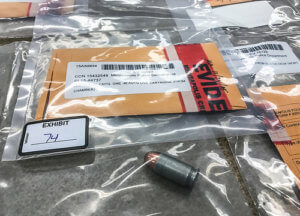A criminal defense attorney can make a motion to suppress evidence from a trial for several reasons. In most cases, the attorney may believe that the evidence was collected illegally by police or that it violates a defendant’s rights in some way.
If you’ve been charged with a crime, your attorney may submit a motion to suppress to prevent specific information from being introduced or discussed during your trial.
What role can a motion to suppress play in protecting your rights, and how does your defense attorney submit the motion to the court?

Protecting Constitutional Rights
The Fourth Amendment to the U.S. Constitution protects citizens against unlawful search and seizure, and a legal principle known as the exclusionary rule prohibits the government from using evidence against you that was obtained illegally.
In most cases, law enforcement officers must obtain search warrants and follow all legal protocols for evidence to be admissible in a criminal case.
The Fifth Amendment also plays a role in defense motions to suppress evidence. Intended to protect individuals’ privacy, the amendment gives defendants the right to remain silent, along with the right of avoiding self-incrimination. Police are required to inform suspects of these rights — known as the Miranda warning — before questioning begins.
Evidence also typically is inadmissible if police obtained it as the result of illegal questioning or an illegal search. In addition, “chain of custody” rules exist for the proper handling and documentation of evidence by police and other government officials. If evidence is mishandled, a judge may rule that it is inadmissible at trial because it has been compromised.
Exceptions to Suppression Rules
Your defense attorney can make a motion to suppress any evidence that was illegally obtained or improperly handled, but exceptions to the rules do exist.
Under the “good faith” exception, a motion to suppress evidence may be denied if the court determines that the law enforcement officer who collected the evidence believed he or she was acting within the law. Good faith can apply even if the officer violated procedural rules.
If a judge determines that a questionably obtained piece of evidence would have been discovered eventually by a legal method, the evidence may be deemed admissible. In addition, if an independent source — someone other than the law enforcement officer who improperly obtained the evidence — would have turned over the same piece of evidence, a motion to suppress may not succeed.
Filing a Motion to Suppress
Illinois state law lays out the procedures for defense attorneys to submit a motion to suppress to the court. Motions must be in writing and must provide the reasons the defense believes the search and seizure of the evidence in question was illegal.
Along with the motion, a defense attorney must provide the judge with any evidence demonstrating the illegality of the search and seizure. The defense carries the burden of proof to show that the evidence should not be admitted in the trial.
The motion must describe the evidence in question in detail and must provide reasons to the court why the judge should find the evidence to be inadmissible. Reasons must be in accordance with the law, and the defense attorney may cite legal precedent established in cases in which evidence was suppressed for similar reasons.
If the judge grants the motion, the property in question is returned to its owner unless there is another legal reason for the government to keep it, but it is not admissible in court. The defense also may try to have the evidence suppressed if it appears that a law enforcement officer acted improperly in obtaining it.
State law requires that a defense attorney submit the motion to suppress before a trial begins, unless the defense team did not know about the possible problem with the evidence at that time. After submission, the court determines whether to grant the motion and issues an order stating the outcome.
Using Every Tool to Defend You
If you’re charged with a crime, you need an attorney who will use every legal tool at his disposal to defend you. By using motions to suppress illegally obtained evidence, Attorney Michael J. Petro protects your constitutional rights. Call him today at 312-913-1111 to ensure that your defense is the best it can be.
Photo Credit: Tony Webster Flick cc